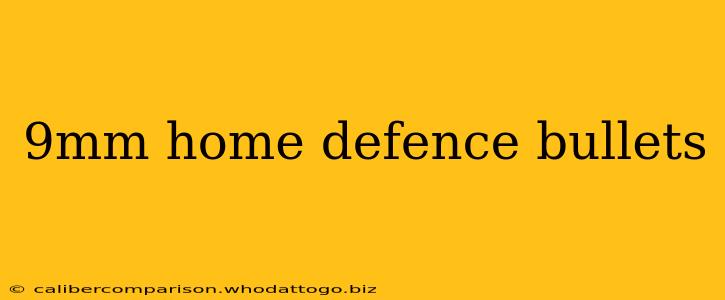Choosing the right ammunition for home defense is a critical decision, and for those using 9mm handguns or carbines, selecting the optimal bullet type is paramount. This guide delves into the characteristics of various 9mm home defense bullets, helping you make an informed choice based on your specific situation and firearm. Remember, responsible gun ownership includes thorough training and understanding of your firearm and ammunition.
Understanding the Factors Influencing 9mm Home Defense Bullet Selection
Several key factors determine the effectiveness of a 9mm round for self-defense within the confines of your home:
-
Expansion: The ability of a bullet to expand upon impact, increasing its diameter and causing more significant tissue damage. This is crucial for stopping a threat quickly and humanely. Over-penetration, however, is a significant concern in a home environment.
-
Penetration: The depth to which a bullet penetrates a target. Sufficient penetration is necessary to reliably incapacitate a threat, but excessive penetration risks endangering bystanders or neighbors. Finding the balance between these two is key for home defense.
-
Fragmentation: While some fragmentation can increase tissue damage, excessive fragmentation can lead to unpredictable bullet trajectories, increasing the risk of collateral damage.
-
Recoil: The force felt by the shooter upon firing. A manageable recoil is essential for rapid follow-up shots, especially under stress.
Types of 9mm Home Defense Bullets
Several types of 9mm bullets are commonly marketed for home defense. Each has its strengths and weaknesses:
1. Jacketed Hollow Point (JHP):
- Description: A lead core covered by a metal jacket with a hollow cavity at the tip. This design promotes expansion upon impact.
- Pros: Generally good balance of expansion and penetration, widely available.
- Cons: Performance can vary significantly depending on the manufacturer and specific bullet design.
2. Hollow Point (HP):
- Description: Similar to JHP but without the metal jacket.
- Pros: Often expands more readily than JHPs, potentially causing more significant tissue damage.
- Cons: More prone to deformation and jamming, potentially less reliable in different firearms.
3. Full Metal Jacket (FMJ):
- Description: A lead core fully encased in a metal jacket.
- Pros: High penetration, generally reliable and inexpensive.
- Cons: Minimal expansion, significantly higher risk of over-penetration, making them less than ideal for home defense. Often legally restricted for self-defense purposes in certain jurisdictions.
4. +P and +P+ Ammunition:
- Description: These rounds are loaded to higher pressures than standard 9mm ammunition.
- Pros: Higher velocity and potentially greater stopping power.
- Cons: Increased recoil, potential for increased wear and tear on your firearm, and a higher risk of malfunction in some firearms. Always check your firearm's manual before using +P or +P+ ammunition.
Choosing the Right 9mm Home Defense Bullet for You
The best 9mm home defense bullet for you depends on several factors:
-
Your firearm: Some firearms may function better with specific types of ammunition. Always test your chosen ammunition in your firearm to ensure reliability.
-
Your skill level: If you're a less experienced shooter, a round with less recoil might be preferable.
-
Your home environment: Consider the construction of your home and the potential for over-penetration. A lighter bullet with better expansion may be preferable in densely populated areas or homes with thin walls.
-
Local laws and regulations: Some jurisdictions restrict the sale or use of certain types of ammunition. Check your local laws before purchasing any ammunition.
Conclusion
Selecting the right 9mm home defense bullet requires careful consideration of expansion, penetration, fragmentation, and recoil. Thorough research, testing with your specific firearm, and professional training are crucial for responsible and effective home defense. Remember to prioritize safety and always follow all applicable laws and regulations. This information is for educational purposes only and does not constitute legal or professional advice. Consult with a qualified firearms instructor and legal professional for personalized guidance.

